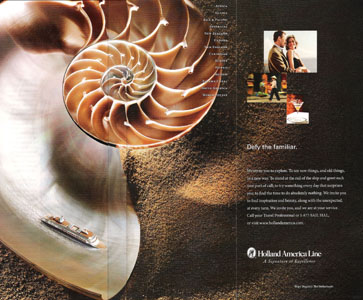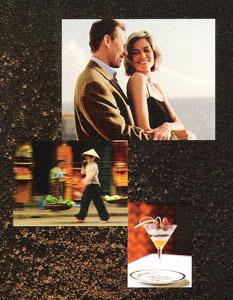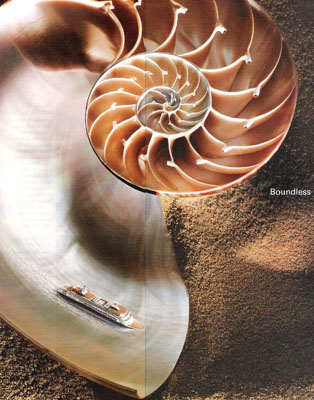|
 This advertisement
appeared in the March 2008 issue of Real Simple magazine. It is quite
different from the other travel advertisements that I have chosen to analyze
because of its seeming absence of people, its simplicity, and unrealistic
nature. At first glance, a cruise ship sails along the bottom of a conch
shell, very serenely, and there is one word: "Boundless," which symbolizes that
this cruise ship can take you anywhere and you can do anything. When the
viewer opens the flap on the right side, they realize that with the Holland
America Cruise Line, they really can go anywhere and do anything--because of
the vast list of locales to which they can take cruises. Also on the inside
flap are the words: "Defy the familiar," further suggesting that their cruises
will bring excitement and something different than the everyday, wherever one
chooses to go. The ad interpellates a subject who wants to experience
something new--away form their everyday life. The images of the couple in
love, the child in an Asian country, and good food also suggest excitement. This advertisement
appeared in the March 2008 issue of Real Simple magazine. It is quite
different from the other travel advertisements that I have chosen to analyze
because of its seeming absence of people, its simplicity, and unrealistic
nature. At first glance, a cruise ship sails along the bottom of a conch
shell, very serenely, and there is one word: "Boundless," which symbolizes that
this cruise ship can take you anywhere and you can do anything. When the
viewer opens the flap on the right side, they realize that with the Holland
America Cruise Line, they really can go anywhere and do anything--because of
the vast list of locales to which they can take cruises. Also on the inside
flap are the words: "Defy the familiar," further suggesting that their cruises
will bring excitement and something different than the everyday, wherever one
chooses to go. The ad interpellates a subject who wants to experience
something new--away form their everyday life. The images of the couple in
love, the child in an Asian country, and good food also suggest excitement.
 The paragraph
underneath the words "Defy the familiar" further suggests the excitement of a
cruise on the Holland America Line. The words "explore," "inspiration,"
"beauty," and "unexpected" suggest excitement as does the phrase suggesting that
the traveler "See things in a new way." The potential traveler is also urged
to "do nothing" and informed that "We invite you, and we are at your service."
This luxury of being able to do nothing and have service is enthralling as well--perhaps the ability to see exciting and exotic things and do nothing on the
same vacation is the allure of a cruise. Holland America seems to think so,
and as a world traveling cruise line, they are probably right, or at least have
the authority to claim this as true (Rose 144). This is the preferred reading
of the advertisemement (Rose 98). The paragraph
underneath the words "Defy the familiar" further suggests the excitement of a
cruise on the Holland America Line. The words "explore," "inspiration,"
"beauty," and "unexpected" suggest excitement as does the phrase suggesting that
the traveler "See things in a new way." The potential traveler is also urged
to "do nothing" and informed that "We invite you, and we are at your service."
This luxury of being able to do nothing and have service is enthralling as well--perhaps the ability to see exciting and exotic things and do nothing on the
same vacation is the allure of a cruise. Holland America seems to think so,
and as a world traveling cruise line, they are probably right, or at least have
the authority to claim this as true (Rose 144). This is the preferred reading
of the advertisemement (Rose 98).
The person
interpellated by this ad is the couple who wants to get away or escape from the
everyday and experience something new and exciting. The ad seems to subtly
suggest (by the lack of reference to children) that this vacation would be
"kid-free," which is appealing to both parents as well as adults with no
children or children who are grown. So, this ad targets a broad range of
people. Although Real Simple magazine is directed toward mothers with
small children,  the magazine is expensive (as far as magazines go) and seems to
be directed at a higher class crowd, those who might leave their children with a
nanny or the grandparents for a week and go on vacation with their husband. I inferred
this upper-middle to higher class audience based on the products mentioned in
articles--expensive clothing, furniture and household items that the average middle-class
mom would probably not purchase. the magazine is expensive (as far as magazines go) and seems to
be directed at a higher class crowd, those who might leave their children with a
nanny or the grandparents for a week and go on vacation with their husband. I inferred
this upper-middle to higher class audience based on the products mentioned in
articles--expensive clothing, furniture and household items that the average middle-class
mom would probably not purchase.
This ad, like the
Carnival ad, and unlike the ads in the other category, features the product it
is trying to sell--featuring an image of the ship, the destination, the food
and the company. Pajnik and Lesjak-Tusek suggest that buying a product is more
than just purchasing the product, but an identity as well: "if we buy the
product, we actually buy the image and at the same time contribute to the
construction of identity--through consumption" (281). Many ads these days are
selling lifestyles and identities, not products, which is the case with this
ad (Pajnik and Lesjak-Tusek 280). The ad interpellates the person who wants to
experience something new and to escape, not the person who already has. This is
another facet of the person's identity that the person has not recognized or experienced
up to this point--thus constructing a new identity by taking this vacation.
|

